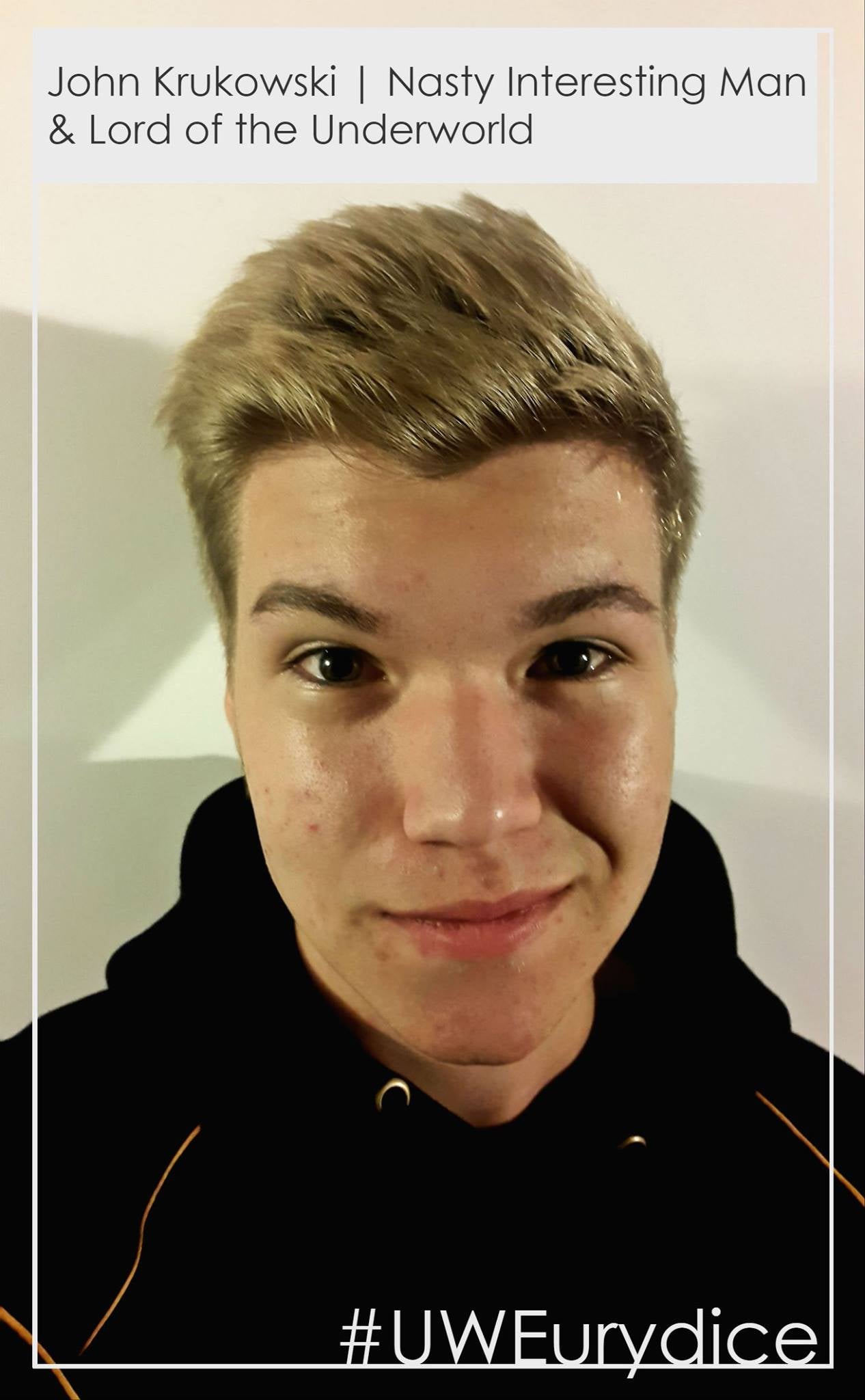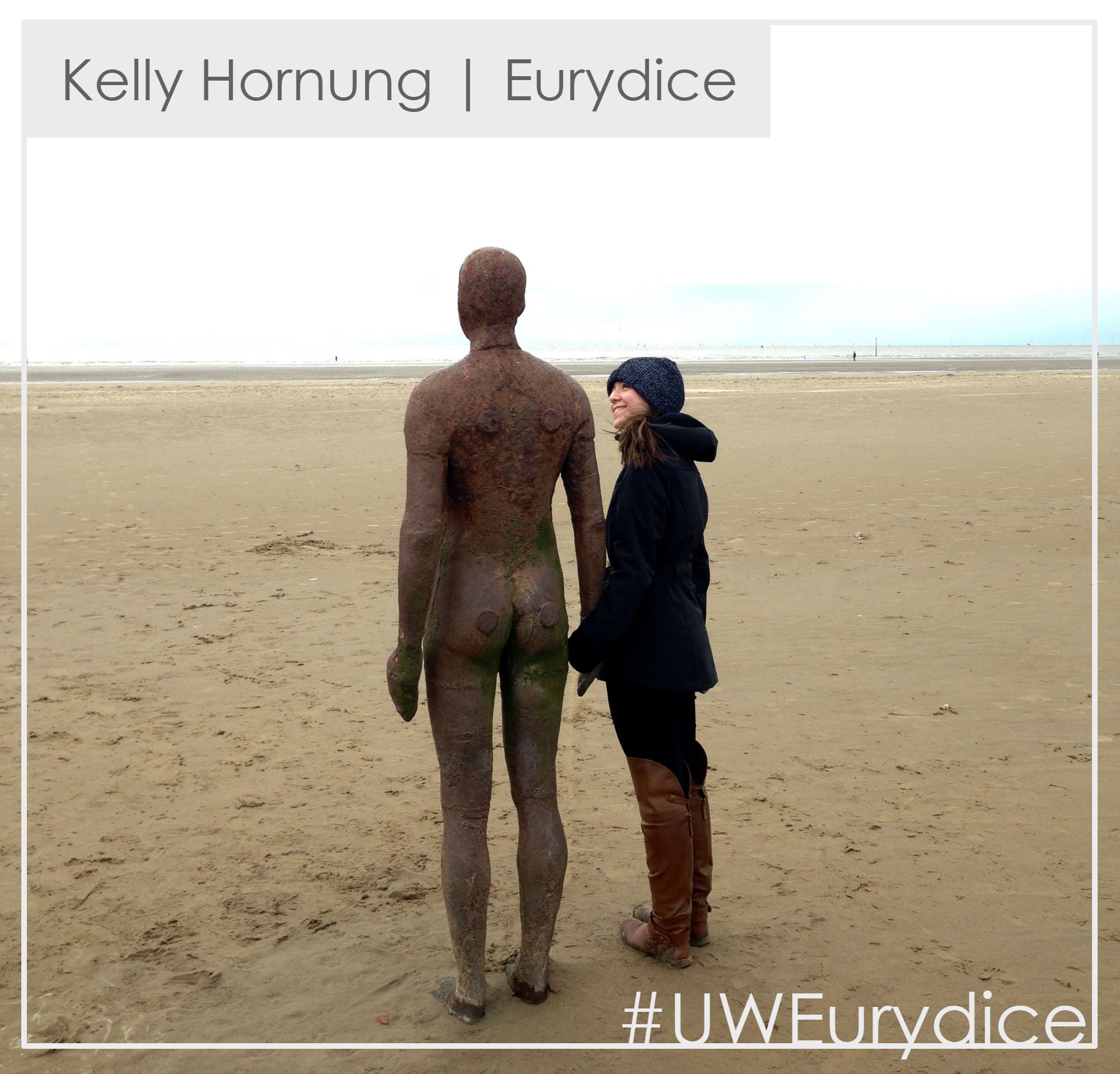Home | Rehearsal Blog | Design Hub | Music Hub | Focus Research | Bibliography
Our Eurydice cast has been hard at work in the Theatre of the Arts for the past few weeks. Get a sneak peek at the rehearsal process, courtesy of the actors themselves!
Being Nasty

This is the first time I will be playing a gross, manipulative character like the Nasty Interesting Man (NIM) in a theatre production, and so there is a lot for me to learn and explore through the rehearsal and performance process. My largest goal in the development of this sociopathic character is to make sure that I am portraying a real person, and not some theatrical reflection of a creepy psycho. If my performance isn’t grounded in real motives and true desires, then the most it can accomplish is entertainment. I want the audience to question their morality, not just laugh or be scared. It should not be my goal to frighten, or entertain an audience, but to allow an audience to observe and submit themselves to a real person, and therefore real life terror. My character is more than a sociopath, he is a man with passion, and a man that wants what many men want- to be liked, and sex. I want people to consider how it is even possible for them to be able to relate to this nasty man. That is a question I too must consider.
There are so many emotions, and traits I will have to let go off to play this man, but there are also things I must find in myself to play him. I’ve found losing my empathy to be quite the challenge. The character of Eurydice is just so likable, and Kelly as an actress is even more so. I have to channel my personal admiration to something darker that fits who NIM is. I have to convert those feelings to an animalistic desire, something savage yet charming. That is where another challenge to the character comes in. I, as John, will have to gather all of my confidence, because confidence is key to playing NIM or any sociopath. He does not believe he is below others. The people around him are there for the taking, or just disposable if not worthy. Through my portrayal of absolute confidence, I would like to connect with the audience in more than just fear, but hopefully a likeability. There’s something fascinating about how people relate to a ‘bad’ guy. Why do we like characters, or even real people, who are obviously hurting or using another person? Is it because we are not the ones being hurt, but just observers to a strange, unhealthy relationship? I would be happy if I made even one person like the character of NIM, only to be ashamed and disgusted with themselves.
On playing Eurydice

Portraying an iconic historic figure is tough work for an actor. Characters that have been filtered through many different interpretations over time are a challenge, because every person who is a part of the show – the director, the creative team, the audience – has their own opinions and views on how the character is to be portrayed.
Sarah Ruhl has given us much to work with in her script for Eurydice; she paints a woman who grows and matures throughout the course of the play, who reconstructs a relationship with her father based on mutual respect and equality, and who learns how to write her own story of her life.
But a woman is more than the text, and bringing a three-dimensional, complex personality to life is my job for this show. Our director, Matt White, has talked to us about bringing the character out through ourselves; that is, to use our own experiences and memories to construct realistic actions and reactions when on stage. While we may not have directly experienced the same things as our characters – I have not had a former husband breach the gates of hell for me – there are things we can draw on to empathize with our character.
When I first read Eurydice, I did not feel much empathy with the titular character at all. She struck me as the usual innocent, naïve romantic lead, with an Ibsen-like twist that set her apart from her historic counterpart. I blamed her for getting involved with a self-absorbed artist in the first place. It is only after spending more time reading Ruhl’s piece and exploring the works of her contemporaries and other like-minded artists that a far richer character has emerged for me.
The relationship between Orpheus and Eurydice as we see at the beginning of the show is not that of a perfect couple; they quarrel and pick at each other in between moments of glazed affection. They are restless. Neither are happy to merely be in the others’ company. When we first began the rehearsal process and I would be asked, “What does Eurydice want from Orpheus?” I thought the answer was simply that she wanted to be loved most by him, more than his music. But since that beginning, something has changed for me. In speaking the text and working with my scene partner, Erik, I have found that what Eurydice wants more than to be loved is for someone to take an interest in her. To value her for more than her looks or her body or for what she can offer them. She wants someone to ask her about her opinions or to talk to them about her big ideas, because she doesn’t feel as though she has the power to begin discussing them on her own.
Haven’t we all felt that way at some point? Too shy to speak up, or to contradict someone we admire or love? Don’t we all silence ourselves from time to time, or chose to be polite and taciturn, rather that seem too bold, too loud or too pretentious? Or waiting for someone to take the initiative to get to know us, because we don’t want to ‘come on too strong’?
It is these feelings drawn from all kinds of experiences that are for both myself and the audience to draw upon. The reason characters last throughout history is because we continue to connect to them and empathize with them. Eurydice in her original form was a woman to feel sorry for and to be envied as the love object of a talented man. What I hope to do with this performance is help rewrite her story as a woman who stops waiting for others to get to know her, and finally tells us who she is herself.
- Kelly Hornung